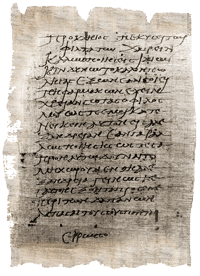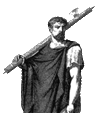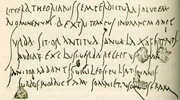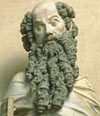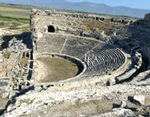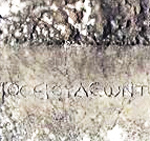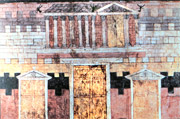No, No - NOT the Comfy Chair!
"Nothing in his letters suggests that Paul had any official standing in his treatment of Christians ...
In opposition to what Luke says, Paul could not have used arrest, torture or imprisonment ... but ... every time Christians went to the synagogue, they laid themselves open to an abrasive challenge from Paul."
– Murphy O'Connor, Paul, His Story, p19.
Paul – "a man of FEW words"?
"But he who was made sufficient to be a minister of the New Testament, not of the letter, but of the Spirit, that is Paul, did not write to all the churches which he had instructed and to those to which he wrote he sent but few lines."
– Church Father Origen, quoted by Eusebius, The History of The Church, 6.25.7.
Real world
A genuine 1st century letter – Papyrus 356, British Museum
This letter – about fifty words – was recovered from Egypt. It is written in koine Greek, like much of the New Testament, and begins and ends with greetings.
"The composition of a letter of the length of 2 Timothy demanded of the ancient art of writing not hours but days of laborious work."
– J.J. Jeremias, Die Pastoralbriefe, 5.
Paul - so Jewish
In the epistles Paul tells us almost no personal details, other than to obsess about his Jewishness:
a way of life in Judaism
advanced in study of Judaism
zealous for Jewish traditions
– Galatians 1.13-14.a Hebrew
an Israelite
a descendant from Abraham
– 2 Corinthians 11.22.a Hebrew of Hebrews
of the tribe of Benjamin
circumcised on 8th day
a Pharisee
– Philippians 3.5.
But should we believe any of this when the same "Paul" tells us that "to the Jews I became as a Jew ... to them without law, as without law ... to the weak became I weak ... I am made all things to all men."– 1 Corinthians 9.20-23.
Beaten by rods?
"Thrice was I beaten with rods" (2 Corinthians 11.25).
The various ranks of Roman magistrates (aediles through to consuls) were entitled to bodyguards called lictors who carried buddles of birch rods (often with one or two axes). The bundles (fasces) were primarily symbols of the magistrate's authority.
A lictor could be directed by his magistrate to inflict a punishment. But where, when and why Paul might have received such treatment is impossible to say.
On the other hand, the reference is almost certainly purely symbolic, calculated to resonate with a Roman, rather than a Jewish, audience.
Religious propaganda in peasant society
"Pasquines were, in effect, political and social siege weapons skillfully used by both the powerful and the weak.
They were always handwritten and were seldom produced in multiple copies, the authors relying on word of mouth to multiply the effects of their insults or charges.
Pasquines were almost always placed on the walls of public places."
– Kenneth Andrien The Human Tradition in Colonial Latin America, 2002.
– Graffiti on a Pompeian wall quotes the poets.
Uncertain ground
"When we try to get behind Marcion to envisage the formation and history of the Pauline corpus before his time we are on uncertain ground."
– F. F. Bruce, Peakes Commentary on the Bible, p935.
Paul in Cyprus? Not a chance
"Luke ... presents Paul and Barnabas going first to Cyprus, and thence into the southern part of central Asia Minor.
A close analysis of this account brings to light so many improbabilities that it becomes impossible to accord it any real confidence."
– Murphy O'Connor, Paul, His Story, p44.
A haircut vow? But wasn't Paul bald?
"Paul ... took his leave of the brethren, and sailed thence for Syria and with him Priscilla and Aquila ... having shorn his head in Cenchraea for he had a vow." – Acts 18.18.
Paul's "vow" before leaving Corinth is curious indeed. Had Paul not set aside the Law of Judaism? The shaving of his head, perhaps beginning or ending the vow of a Nazir, surely had no place in the new Christ cult.
Perhaps he was copying the priests of Isis?!
Inspiration?
Equally curious is that Josephus, in his history, having introduced Aquila, governor of Alexandria, says that when Agrippa reached Jerusalem he "ordained that many of the Nazirites should have their head shorn." – Antiquities 19.6.1.
Just another coincidence?
Acts
The core of the Pauline myth is to be found in just a few verses of the "confessional statement" in the book of Acts:
"When they heard him speak to them in Hebrew, they became very quiet. Then Paul said:
"I am a Jew, born in Tarsus of Cilicia, but brought up in this city. Under Gamaliel I was thoroughly trained in the law of our fathers and was just as zealous for God as any of you are today.
I persecuted the followers of this Way to their death, arresting both men and women and throwing them into prison, as also the high priest and all the Council can testify.
I even obtained letters from them to their brothers in Damascus, and went there to bring these people as prisoners to Jerusalem to be punished."
– Acts 22.2-5.
Parallel yarns
Simon and Paul try to "please men."
Simon and Paul have visions.
Simon and Paul perform miracles.
Simon and Paul succeed as missionaries.
Simon and Paul oppose the law.
Simon and Paul offer salvation.
Simon and Paul persecute the saints.
Simon and Paul interpret the Cross
Simon and Paul share disease/ humility
Simon and Paul change their appearances
Simon and Paul go to Rome in reign of Claudius.– Hermann Detering The Dutch Radical Approach to the Pauline Epistles
Evidence of the makeover – the tensions of "Paul" –
Paul is pro-Law?"For not the hearers of the law are just before God, but the doers of the law shall be justified."
– Romans 2.13.
"Do we then make void the law through faith? God forbid: yea, we establish the law."
– Romans 3.31.
"Wherefore the law is holy, and the commandment holy, and just, and good."
– Romans 7.12."But this I confess unto thee, that after the way which they call heresy, so worship I the God of my fathers, believing all things which are written in the law and in the prophets." – Acts 24.14.
Paul is anti-Law?
"Christ hath redeemed us from the curse of the law, being made a curse for us: for it is written, Cursed is every one that hangeth on a tree." – Galatians 3.13.
"Therefore by the deeds of the law there shall no flesh be justified in his sight: for by the law is the knowledge of sin ... Therefore we conclude that a man is justified by faith without the deeds of the law." – Romans 3:20,28
"But now we are delivered from the law, that being dead wherein we were held; that we should serve in newness of spirit, and not in the oldness of the letter." – Romans 7.6.
"For Christ is the end of the law for righteousness to every one that believeth." – Romans 10.4.
The Jews of Miletus
The Jews adapted happily to Hellenistic culture in Asia Minor.
At Miletus, connected by a Sacred Way to the Temple of Apollo at nearby Didyma, the "Jews and God-fearers" had reserved seats in the fifth row of the theatre – as an extant inscription attests.
Evidence of Jewish assimilation of Hellenism, cut in stone.
Who sits as God in the Temple of God?
Hadrianic temple on Temple Mount – Dura Europa fresco.
An equestrian statue of Hadrian stood nearby. Did Hadrian exalt himself "above all that is called God"?
Paul - inventor or invention? One curiosity about Paul's letters is that they survived at all. Polemical and often scathing in tone one wonders why the recipients kept them safe for generations, copying hostile texts not cited by the later gospel writers and neglected by the brethren at large for a century or more. Not until Marcion, the heretical bishop from Pontus, published several Pauline letters in the middle decades of the 2nd century were the epistles acknowledged or quoted. Who, one wonders, in Paul's faction-riven churches, decided to regard the apostle's rambling missives as tantamount to "scripture", on a par with the Tanakh, the only other sacred writings they might have known? Why would early Pauline converts have hung on to his letters anyway – had they not just learned from the master that the existing world would soon pass away? Who, in a time of apocalyptic anticipation, would have been so motivated (and able) to gather a collection letters purportedly sent everywhere from Rome to Galatia? The truth is that Paul's letters are not what they appear to be – and more to the point, not when they appear to be.
Genuine Fakes
In comparison, the longest letter of Cicero (xv, to P. Lentulus Spinther in Cilicia, written in Rome, 54 BC) has 5200 words. And yet Cicero was a wealthy Roman aristocrat, a consul of Rome, who was more than able to afford secretaries and scribes. In contrast Paul was supposedly a peripatetic missionary, often in dire straits ("poor, yet making many rich" - 2 Corinthians 6.10). Could Paul – or his fledgling "churches" – really have afforded his verbose and truculent letters – and would they have regarded them as an appropriate use of their money? Whilst so much ancient writing is fragmentary, in the Pauline epistles we have a comprehensive corpus of doctrine, meeting all the needs of a functioning Church. Though many curious and suspicious gaps obscure the life of the evangelist himself, his theology is complete and entire. That letters were forged in the name of Paul, and over an extensive period of time, is beyond doubt. 3 Corinthians, for example – part of the New Testament apocrypha – is an anti-gnostic forgery penned by Catholics in the late 2nd century. So, too, are purportedly Pauline letters to the Laodiceans and Alexandrians. The witness for this is no hostile critic of Christianity but the earliest list of "orthodox" texts, named for its 18th century Italian discoverer Muratori. This document includes the comment:
"Paul the Missionary" – an impostor None of the pegs which purport to attach Paul to the secular history of the middle years of the 1st century can withstand scrutiny (not Aquila and Priscilla, not Gallio, not Aretas, not Nero). Oddly, in a compendium of letters amounting to about 44,000 words, nothing unambiguously "dates" the writer. Did Paul really evangelize among the Gentiles? A simple yet undeniable truth is that NOT ONE of the early Christian churches in the major cities of the Roman world owed anything to a pioneering apostle called Paul. Without exception, the circumstances in which these churches emerged, and the personalities involved, are quite unknown. Manifestly, no charismatic founder was required for Hellenized Jews and Judaizing pagans to synthesize a revised Judaism for an age which despised Jewish exclusivity and viewed with alarm the messianic ambition of Judaism. Evidently, the foundational events were unknown even as early as the 2nd century – or were deliberately obscured in the collective memory of the Church to hide less heroic and more mundane origins. That Paul did not "found churches" casts further doubt on his grand missionary journeys. They are demonstrably fables of an idealized progenitor, an iconic, heroic and palpably unreal figure.
But the evangelists were not original minds. "Paul the Apostle" was plagiarized from earlier sources and part of the Lukan creation may have been a minor figure from the early years of the 2nd century, similar to – if not indeed identical with – the heretic teacher "Paul of Antioch," whose "skill in argument" influenced, but failed to convince, Origen as a boy (Eusebius, History of the Church, 6.2.13-14). In any event, if the epistles of Paul are fake, if the missionary journeys of Paul are fake, what confidence can we have that Paul himself has any integrity as an historical character?
The aggrandizing of Paul – "Dr Luke" builds a proselytizing apostle
But curiously, Paul himself says nothing of "Doctor" Luke – other than three passing mentions in epistles deemed "inauthentic" by most scholars. It is salutary to note that the many "facts" about Paul found in Acts gain no support at all from the Pauline epistles. In most cases, the "facts" are starkly contradicted by the man himself or undermined by common sense. So just what was Dr Luke up to? Essentially, the author of Acts fabricated a "history of the Church" which both legitimized the power base of several key bishoprics and transformed what – perhaps – was an obscure theorist based Asia Minor or Syria into a model Jewish convert, amiable team-player and Roman-friendly evangelist.
– Paul studied under Gamaliel, the great Pharisaic teacher? (Acts 22.3) Not a claim Paul makes but the assertion serves to emphasize Paul's prowess in Judaism. All the better that a peerless Judaist should become the paramount apostle of Christ. It's worth noting that the claim can scarcely be true – Gamaliel, a senior Rabban, taught advanced students not children. To strengthen its point Acts also has Paul speak Hebrew (22.2), a talent not vouchsafed by Paul's own writings where he habitually quotes from the Greek Septuagint not the Hebrew scriptures. – Paul is a tentmaker? (Acts 18.3) Not said by Paul but a "good Jew", even a Pharisee, unless independently wealthy, probably had a trade. Paul's work record is very patchy – his "ministry" seems to have paid for his meandering existence. Twenty years in Jerusalem and he seems never to have worked. It seems his faith provided his reward:
Dr Luke even implies that Paul was a member of the Jewish council, the Sanhedrin, which reached decisions by voting: "I put many of the saints in prison, and when they were put to death, I cast my vote against them." (Acts 26.10). But just what does Paul mean by persecuted? Shorn of the lurid amplification of Acts – which cannot stand close scrutiny – this is no more than verbal hyperbole and may well be Catholic redaction, itself based on the yarn in Acts.
It is this incident which introduces Paul's career as a "persecutor" and yet Paul is said to have been a student of none other than the Gamaliel who had urged caution! (Acts 22.3).
Although Acts repeats this tale three times (and each time rather differently!) the classic encounter with the risen Christ has no place in Paul's own epistles. Paul speaks of a "revelation of the Son" but notably avoids giving any details of when or where. Paul stresses, if anything, his being "chosen while in the womb" (Galatians 1.15,16) – which rather detracts from any later encounter. Paul does write (oddly, using the third person) of an "out of body" experience, though it bears nothing in common with the Damascene road show:
When Paul does write of Damascus it is not about the king of heaven but of King Aretas and an attempt to arrest him (2 Corinthians 11.32). But as a "team building" yarn the Damascene road anecdote allows an early Christian – Ananias*– to intercede with the apostles on behalf of Paul and off they go to Jerusalem to meet the rest of the gang. Paul himself says he went to Arabia and emphasizes that he saw no one. As a nice little touch, when the blinded "Saul" waits out his three days in Damascus before Ananias delivers the Holy Spirit, he stays at the house of a Judas (Acts 9.11), a name symbolic of the entire Jewish race, of course – just like his namesake Judas Iscariot.
Manifestly, Paul's policy owes nothing to any edict from James on food prohibitions but is sheer pragmatism. – Paul went to Jerusalem with famine relief? Another curious yarn from Acts involves prophets from Jerusalem visiting Antioch. One of them, Agabus by name, predicts famine. Even though Agabus says specifically that the famine will be "world-wide" the brethren of Antioch decide to raise gifts for the brothers of Judaea, to be delivered by Paul and Barnabas.
But of course there was no famine "spread over the entire Roman world." Roman historians regularly attest to localized droughts and food shortages in various provinces of the empire, a different matter entirely. The soothsayer Agabus is wrong about the famine, as he is later in Acts when he predicts Paul will be "bound by his own belt and handed over to the Gentiles by the Jews" (Acts 21.10). When Luke writes that particular part of the fable he has the Jews try to kill Paul and his hero is rescued by Roman soldiers! But the most damning comment about "famine relief" comes from Paul himself – he says not a word! In fact, Paul got into raising money "for the saints" from his earliest mission:
Claims designed to make Paul more acceptable to the Roman world:
As a story element "Roman citizenship" gets Paul out of jail in Philippi after a single night – yet in Caesarea Paul languishes in jail for two years! Only then does Paul's "Roman" status move the story on to the required climax in Rome. – Paul is from Tarsus? Paul himself never says this either, but the city was noted as an "intellectual" centre of the Roman world. Augustus actually appointed a stoic philosopher, Athenodorus of Tarsus, as governor of Cilicia. Paul is also made to claim to be a "Pharisee, a son of a Pharisee" (Acts 23.6) – which could not be true if Paul really was a Jew from the diaspora – there were no Pharisees in the diaspora! Jerome (Commentaria in Epistolam ad Philemon 23.4) says Paul was from Galilee. – Paul went on a first mission to Cyprus? From Paul, not a word about Cyprus, nor is there any "epistle to the Paphosians". But the yarn conveniently brings Paul before a Roman governor and facilitates a prestigious conversion. The veracity of such a claim is belied by the lack of any evidence of Christianity on the island for centuries. – Paul lived and evangelized in Rome itself? The happy ending to Acts has Paul holding court in the imperial city – yet Paul's final epistle, Romans, has the great apostle anticipating a mission to Spain. The so-called "prison epistles", said to have been written in Rome, are used to support a variety of conflicting scenarios, but they are late and fake. In the hands of "Dr Luke" Paul is moulded into the perfect "apostle to the Gentiles." But just who (or what) was the kernel about which the story teller wove his edifying tale of missionary triumph?
How DID "Paul" get started? The Charlatan Hypothesis
But more effective than any letter in raising a following would have been public performances in forums and village gatherings, where artful chicanery would suspend the laws of physics and "malevolent spirits", supposedly the cause of sickness, would be expelled by "exorcism". Such mighty works pepper the New Testament. A major feature of Jesus' ministry is portrayed as curing people of demonic possession through exorcism – most famously, the "demons into pigs" episode at Gadara (Mark 5.7-13). It was this power to expel devils and unclean spirits that JC gave to the twelve when he sent them on their first mission:
With the streets of every ancient city thronging with fearfully superstitious people, our "healer" eventually attracted the interest of desperate Roman matrons (a Priscilla or a Lydia?) able to pay for his "Jewish" cures and lucky charms. His words would have acquired a sought after "authority", opening up the opportunity to write (or dictate) letters, offering unsolicited guidance for faith and appealling for funds. Perhaps our showman called himself Paul – who can say. But once Pauline authorship became the touchstone of authoritative teaching, every contending Christian faction claimed Paul for themselves and wrote in his name. An indication that such a scenario may be more than speculation is provided by a 4th century churchman – Epiphanius.
The Ebionites castigate a certain adventurer called Paul The source is late but the story is intriguing. Epiphanius, 4th century bishop of Salamis with a large sphere of influence in the eastern Mediterranean, reported on the Ebionites in his magnum opus on heresies. According to Epiphanius the Ebionites said that Paul had been the offspring of non-Jewish parents and had himself converted to Judaism while in Tarsus. He had never studied with Gamaliel or been a Pharisee but rather had attached himself to the Sadducee High Priest as some sort of henchman. When he was passed over for advancement Paul broke with the High Priest and retaliated by setting up his own cult, a concoction of Hellenistic dying/reborn sun-god motifs blended with Jewish scripture and tradition. In short, Paul was a Hellenistic adventure of undistinguished background. The Ebionites were declared heretics by rabbis of the Jewish establishment, probably no earlier than 135 AD.
Simon Magus - primordial Paul?
Witness to Simon's existence is found in Josephus' Antiquities 20.7.2, where a friend of Felix, the procurator, "Simon, a Jew from Cyprus, who pretended to be a magician," is instrumental in persuading Druscilla (the sister of Herod Agrippa II) to divorce her husband and marry Felix. Felix governed the Jews between 52-60 AD (the "time of Paul"). In some manuscripts the name "Atomos" replaces Simon. Acts relates its own yarn about Simon the Magician (like Paul, he is unmentioned in the Gospels).
Simon clearly had awesome bewitching power. For centuries, the Christians kept up the attacks, naming him the "father of all heresies" and weaving into the fantasy Helen of Troy and/or a prostitute called Helena, Nero (who else!) and a battle of magic with Peter. His name was stigmatized by the Christians in the sin of simony (the buying and selling of ecclesiastical favours) and Gnostics were characterized as "Simonians." Acts reprises the "Jewish magician of Cyprus" story cribbed from Josephus on two further occasions. In the first episode (Acts 13.6-12) the sorcerer's name is switched to "Bar Jesus / Elymas by interpretation." Paul blinds his rival with a holy incantation. This little drama will later get transferred to Rome (in the Clementine Recognitions) where Simon's adversary becomes Peter rather than Paul (and Paul gets blended into Simon!). The second episode is Acts 24.24-26 where Felix and his new wife Druscilla are brought back on stage. Paul, a prisoner, nonetheless induces "trembling" in the tough Roman governor by the force of his sermonizing (!). Ludicrously, Felix, probably the richest as well as most powerful man in the province, "hopes for a bribe" from the apostle locked in his own prison (which of course reintroduces the element of venality attached to Simon)!
Paul re-made The history of Josephus has a missing section after Antiquities 20.7. – one of those "curious" lacunas that obscures crucial episodes in the Christian story (like the fifth book of Tacitus' Annals, covering the years 29-31, and books eleven through to sixteen covering the years 47-66). How convenient for those who wish to obscure Christian origins! However, for all the manipulations and flip-flops with the texts it may well be the case that at an early stage in the development of the character styled Paul, a "Simon Paul" confronted a "Simon Peter". But as the Catholics successfully assimilated their Marcionite and Gnostic opponents the legendary Paul was reworked in Acts of the Apostles. He acquired a pre-conversion persona inspired by the Saulus mentioned by Josephus. Post-Damascus, he acquired an harmonious, almost subordinate relationship with the apostles in Jerusalem. By the end of the 2nd century prophecies of the coming of Paul within Jewish scripture were being identified by Christian theorists, in a manner painfully reminiscent of the concoctions teased out for Jesus himself. Tertullian found Paul "foreseen" in the book of Genesis:
Judaism's perverse food prohibitions were, perhaps, the first anti-social behaviour to be relaxed. Attendance at the race track or the theatre was surely not harmful to God? If many "god-fearers" were repulsed by circumcision "as it was not their custom," why bar them from the local synagogue? And certainly, all might contribute to "collections for the saints." The replacement of an odious notion of a "chosen people" with a more inclusive doctrine that "all might be saved" by the Jewish God was a natural, not a miraculous, development. The theological novelty – a self-sacrificing redeemer "in times past" replacing Judaism's anticipated world conqueror, was reassuring to authority that at least some Christ-cults were not aiming at sedition and made the corridors of power accessible to God's vicars on earth. Priestly ambition to homogenize the variant factions or eliminate rivals drove forward the polemics of the so-called epistles until a universal, Catholic harmony was achieved. What we have in Paul is not a super-apostle but a superlative fraud.
PS: Pauline epistles: Before or after destruction of the Temple?
Sources:
'Save' a friend e-mail this page
Copyright © 2009
by Kenneth Humphreys.
|
||||||||||||||||||||||||||||||||||||||||||||||||||||||||


